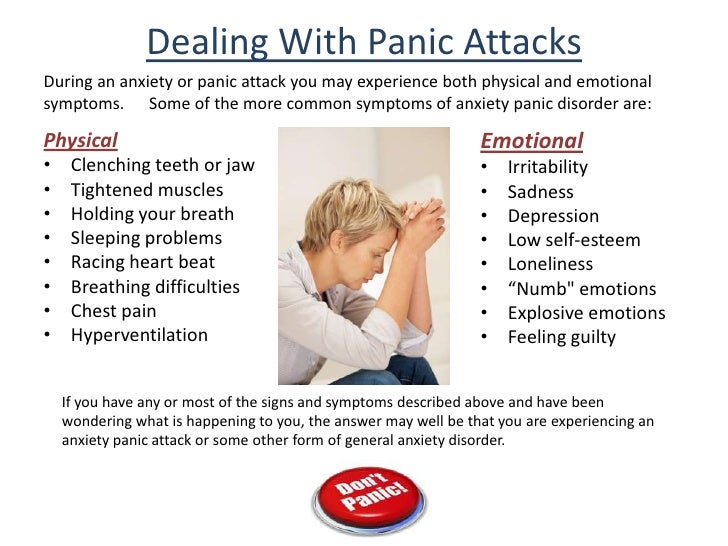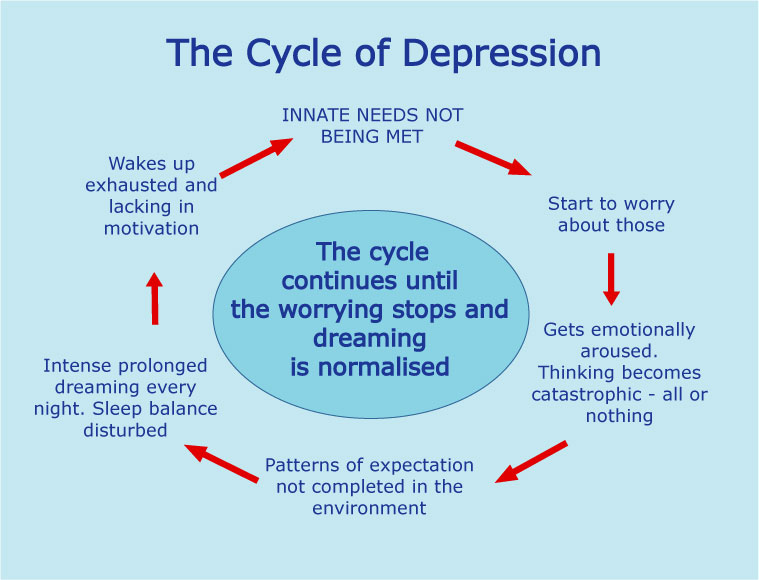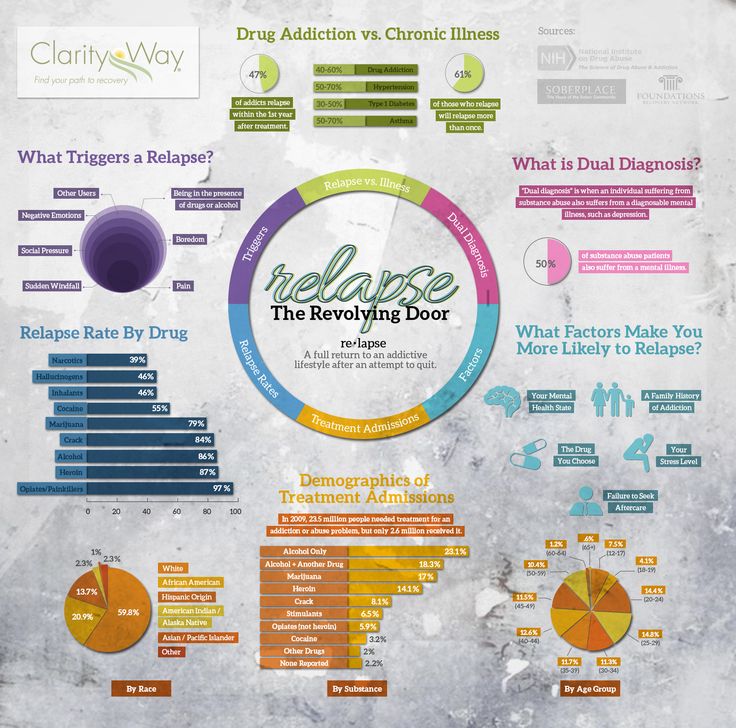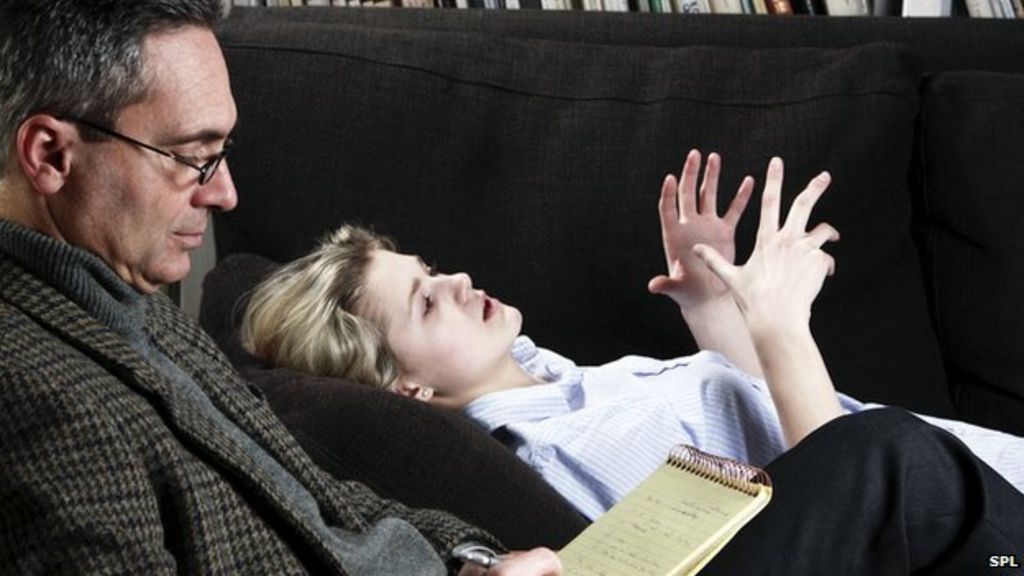How to cope with a panic attack
How to deal with panic attacks
A panic attack is a feeling of sudden and intense anxiety.
Panic attacks can also have physical symptoms, including shaking, feeling disorientated, nausea, rapid, irregular heartbeats, dry mouth, breathlessness, sweating and dizziness.
The symptoms of a panic attack are not dangerous, but can be very frightening.
They can make you feel as though you are having a heart attack, or that you are going to collapse or even die.
Most panic attacks last somewhere from five minutes to half an hour.
How to handle a panic attack
Professor Paul Salkovskis, Professor of Clinical Psychology and Applied Science at the University of Bath, says it's important not to let your fear of panic attacks control you.
"Panic attacks always pass and the symptoms are not a sign of anything harmful happening," he says. "Tell yourself that the symptoms you're experiencing are caused by anxiety."
He says don't look for distractions. "Ride out the attack. Try to keep doing things. If possible, it's important to try to remain in the situation until the anxiety has subsided."
"Confront your fear. If you don't run away from it, you're giving yourself a chance to discover that nothing's going to happen."
As the anxiety begins to pass, start to focus on your surroundings and continue to do what you were doing before.
"If you’re having a short, sudden panic attack, it can be helpful to have someone with you, reassuring you that it will pass and the symptoms are nothing to worry about," says Professor Salkovskis.
Breathing exercise for panic attacks
If you’re breathing quickly during a panic attack, doing a breathing exercise can ease your other symptoms. Try this:
- breathe in as slowly, deeply and gently as you can, through your nose
- breathe out slowly, deeply and gently through your mouth
- some people find it helpful to count steadily from one to five on each in-breath and each out-breath
- close your eyes and focus on your breathing
You should start to feel better in a few minutes. You may feel tired afterwards.
You may feel tired afterwards.
Visit the No Panic website for another breathing exercise to calm panic.
Ways to prevent panic attacks
"You need to try to work out what particular stress you might be under that could make your symptoms worse," says Professor Salkovskis. "It's important not to restrict your movements and daily activities."
- Doing breathing exercises every day will help to prevent panic attacks and relieve them when they are happening
- Regular exercise, especially aerobic exercise, will help you to manage stress levels, release tension, improve your mood and boost confidence
- Eat regular meals to stabilise your blood sugar levels
- Avoid caffeine, alcohol and smoking – these can make panic attacks worse. Panic support groups have useful advice about how you can effectively manage your attacks. Knowing that other people are experiencing the same feelings can be reassuring. Your GP can put you in touch with groups in your area
- Cognitive behavioural therapy (CBT) can identify and change the negative thought patterns that are feeding your panic attacks
Is it panic disorder?
If you feel constantly stressed and anxious, particularly about when your next panic attack may be, you may have panic disorder.
People with panic disorder may avoid situations that might cause a panic attack. They may also fear and avoid public spaces (agoraphobia).
"There's no quick fix, but if your attacks are happening time after time, seek medical help," says Professor Salkovskis.
Read more about panic attacks, including personal stories, at See Me Scotland.
What They Are, How to Stop, and More
Panic attacks can be scary and may hit you quickly. Here are 12 strategies you can use to try to stop or manage panic attacks. Some may help you in the moment, while others can help in the longer term.
1. Seek
counselingCognitive-behavioral therapy (CBT) and other types of counseling can often help people who have panic attacks and who have panic disorders. CBT aims to help you change the way you see challenging or frightening situations and to help you find new ways to approach these challenges as they arise.
You can find CBT for individuals or groups, online or face-to-face, and the length of treatment can also vary.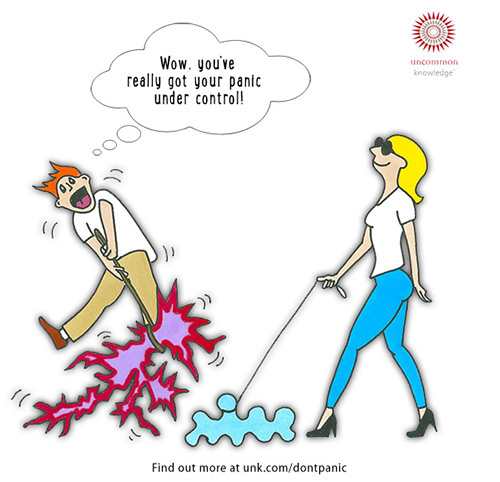 In exposure-based CBT, your therapist will expose you to something that can trigger a panic attack and help you work your way through it.
In exposure-based CBT, your therapist will expose you to something that can trigger a panic attack and help you work your way through it.
As well as changing behavior, there is some evidence that CBT might affect structures in your brain that are responsible for panic symptoms.
In 2018, some researchers found evidence that people who attended four weekly sessions of exposure-based CBT experienced changes in the neural pathways involved in panic symptoms. However, this was an early study, and more research is needed.
In 2018, 37 people in Korea attended a mindfulness-based program once a week for 4 weeks, to see if brief treatment would help reduce symptoms of panic disorder. One aspect of the treatment was to focus on their heart rate, as some people experience cardiovascular symptoms during a panic attack.
The findings suggested that the participants could better manage their symptoms using their own thought processes after the treatment. However, this was a small study, and there was no control group. More research is needed to find out how effective short-term therapy can be.
More research is needed to find out how effective short-term therapy can be.
2. Take medications
Benzodiazepines, such as alprazolam (Xanax), can help treat the symptoms of panic when they occur.
However, they won’t help treat an underlying anxiety disorder and can quickly lead to dependence. For this reason, doctors only recommend them for short-term use during a crisis.
Because benzodiazepines are a prescription medication, you’ll likely need a panic disorder diagnosis to have the medication on hand.
In some cases, a doctor may prescribe anti-depressants for long-term use. Examples include:
- selective serotonin reuptake inhibitors (SSRIs), such as escitalopram (Lexapro) or fluoxetine (Prozac)
- serotonin-norepinephrine reuptake inhibitors (SNRIs), such as duloxetine (Cymbalta)
- anti-anxiety drugs, for instance, azapirone (Buspirone)
Some anti-seizure medications, such as pregabalin or clonazepam, can also help treat anxiety.
Which drugs can treat anxiety disorder?
3. Use deep breathing
While hyperventilating is a symptom of panic attacks that can increase fear, deep breathing can reduce symptoms of panic during an attack.
In one study, published in 2017, 40 people joined either a therapy group that involved deep or diaphragmatic breathing or a control group. After 20 intensive training sessions, those who practiced deep breathing saw improvements in their attention levels and emotional well-being.
Blood tests also showed lower cortisol levels in this group, suggesting lower levels of stress. The participants did not have panic disorder, but the strategies could help people who have panic attacks.
Another group of scientists found that slow breathing could have similar effects. They suggested it could also improve feelings of relaxation, comfort, and alertness and reduce symptoms of arousal anxiety, depression, anger, and confusion.
If you’re able to control your breathing, you’re less likely to experience the hyperventilating that can make other symptoms — and the panic attack itself — worse.
Focus on taking a deep breath in through your nose, feeling the air slowly fill your chest and belly. Then slowly exhale through your mouth and feel the air leave your body. Breathe in through your nose for a count of four, hold for a second, and then breathe out through your nose for a count of four:
What is diaphragmatic breathing and how do you do it?
4. Recognize that you’re having a panic attack
By recognizing that you’re having a panic attack instead of a heart attack, you can remind yourself that this is temporary, it will pass, and that you’re OK.
Take away the fear that you may be dying or that impending doom is looming, both symptoms of panic attacks. This can allow you to focus on other techniques to reduce your symptoms.
It is not always possible to avoid triggers for a panic attack, but if you know what triggers it, this can help you understand that it is a panic attack and not something else.
5. Close your eyes
Some panic attacks come from triggers that overwhelm you. If you’re in a fast-paced environment with a lot of stimuli, this can feed your panic attack.
If you’re in a fast-paced environment with a lot of stimuli, this can feed your panic attack.
To reduce the stimuli, close your eyes during your panic attack. This can block out any extra stimuli and make it easier to focus on your breathing.
6. Practice mindfulness
Mindfulness can help ground you in the reality of what’s around you. Since panic attacks can cause a feeling of detachment or separation from reality, this can combat your panic attack as it’s approaching or actually happening.
Mindfulness involves:
- focusing your attention on the present
- recognizing the emotional state you’re in
- meditating to reduce stress and help you relax
Focus on the physical sensations you are familiar with, like digging your feet into the ground or feeling the texture of your jeans on your hands. These specific sensations ground you firmly in reality and give you something objective to focus on.
Experts say that mindfulness strategies, such as meditation, can help manage anxiety symptoms, although it’s not clear they can treat an underlying anxiety disorder.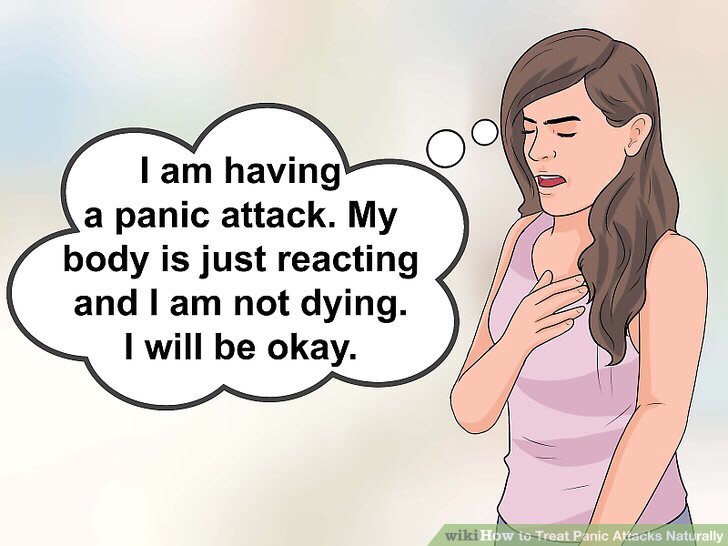
American Family Physician recommended mindfulness as a strategy for dealing with panic and anxiety in 2015, saying it can be as helpful for reducing stress as CBT and other behavioral therapies.
Some research has suggested that mindfulness-based cognitive therapy could help people with anxiety disorders who are receiving medical treatment but haven’t found drug treatment helpful.
Online meditation options
Read our review of the best online meditation options to help find the right fit for you.
7. Find a focus object
Some people find it helpful to find something to focus all their attention on during a panic attack. Pick one object in clear sight and consciously note everything about it possible.
For example, you may notice how the hand on the clock jerks when it ticks, and that it’s slightly lopsided. Describe the patterns, color, shapes, and size of the object to yourself. Focus all your energy on this object, and your panic symptoms may subside.
8. Use muscle relaxation techniques
Muscle tension is a symptom of anxiety, and muscle relaxation techniques can help reduce tension and promote relaxation during an attack. Progressive muscle relaxation aims to release tension in one group of muscles at a time to relax the whole body.
Much like deep breathing, muscle relaxation techniques can help stop your panic attack in its tracks by controlling your body’s response as much as possible.
If you attend muscle relaxation therapy, your therapist might take you through the following steps:
- First, you may learn how to tense the muscles before releasing the tension.
- Then, you will learn how to relax the muscles without tensing them first.
- You may also learn how to relax specific sets of muscles, for example, in the shoulders, for practical use in everyday situations.
- Finally, you may learn how to practice rapid relaxation, when you can identify any areas of tension and release it as needed.

To start relaxing your muscles at home, consciously relax one muscle at a time, starting with something simple like the fingers in your hand, and move your way up through your body.
Muscle relaxation techniques will be most effective when you’ve practiced them beforehand.
9. Picture your happy place
Guided imagery techniques can help reduce stress and anxiety. Research suggests that both spending time in nature and visualizing nature can help treat and manage anxiety.
What’s the most relaxing place in the world that you can think of? A sunny beach with gently rolling waves? A cabin in the mountains?
Picture yourself there and try to focus on the details as much as possible. Imagine digging your toes into the warm sand, or smelling the sharp scent of pine trees.
This place should be quiet, calm, and relaxing — no streets of New York or Hong Kong, no matter how much you love the cities in real life.
Here, learn about five visualization techniques that can help you meditate.
10. Engage in light exercise
Research shows that regular exercise can not only keep the body healthy but boost mental well-being, too.
Experts have found that exercising at 60 to 90 percent of your maximum heart rate for 20 minutes three times per week can help reduce anxiety.
If you are not used to exercising, talk with your doctor before starting. There is some evidence that starting aerobic exercise anew can trigger additional anxiety in people with an anxiety disorder. Building up gradually can help your body adjust and avoid breathing problems. Aerobic exercise includes activities such as running on a treadmill.
If you feel stressed or you’re hyperventilating or struggling to breathe, stop and take a rest or choose a more moderate option, such as walking, swimming, or yoga.
11. Keep lavender on hand
Lavender is a traditional remedy that many people use to reduce stress and help them relax.
Research suggests it has a calming effect but doesn’t lead to dependence or cause withdrawal symptoms. Using products that contain diluted lavender oil may help reduce or manage symptoms of anxiety.
Using products that contain diluted lavender oil may help reduce or manage symptoms of anxiety.
However, the Food and Drug Administration (FDA) does not regulate essential oils, and strengths and ingredients vary widely.
If you use lavender essential oil, make sure you:
- get your oil from a reputable source, such as a pharmacy
- follow the instructions for use
- avoid applying concentrated oil directly to the skin
- avoid using lavender with benzodiazepines because the combination can cause intense drowsiness
While research suggests there are health benefits, the FDA doesn’t monitor or regulate the purity or quality of essential oils. It’s important to talk with a healthcare professional before you begin using essential oils and be sure to research the quality of a brand’s products. Always do a patch test before trying a new essential oil.
Which essential oil is right for you?
12. Repeat a mantra internally
Repeating a mantra internally can be relaxing and reassuring, and it can give you something to grasp onto during a panic attack.
Whether it’s simply “This too shall pass,” or a mantra that speaks to you personally, repeat it on loop in your head until you feel the panic attack start to subside.
Panic attacks are sudden, intense surges of fear, panic, or anxiety. They are overwhelming, and they have physical as well as emotional symptoms.
If you have a panic attack, you might find you have difficulty breathing, you sweat profusely and tremble, and you may feel your heart pounding.
Some people will also experience chest pain and a feeling of detachment from reality or themselves during a panic attack, so they may think they’re having a heart attack. Others have reported feeling like they are having a stroke.
Causes
Panic attacks can happen for various reasons, and sometimes they happen for no apparent reason.
You’re more likely to experience them if you:
- have panic disorder
- have another anxiety disorder
- use certain substances or have a substance use disorder
- use certain medications
- have a medical condition, such as an overactive thyroid
- have a condition that involves psychosis
A panic attack often happens when you’re exposed to a trigger, but triggers vary widely between people.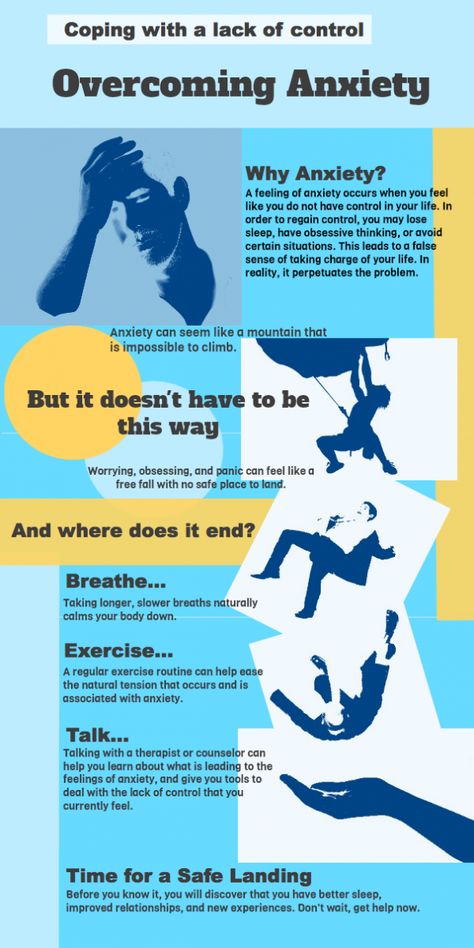 In some cases, there may be no clear trigger.
In some cases, there may be no clear trigger.
However, some people find that the following can trigger an attack:
- social events
- public speaking
- conflict
- situations that remind you of past or current stress in your life
Here, learn more about the causes and triggers of panic attacks.
Symptoms
The Diagnostic and Statistical Manual of Mental Health Disorders, Fifth Edition (DSM-5) defines a panic attack as “an abrupt surge of intense fear or discomfort.”
They tend to start without warning, and symptoms reach a peak within minutes.
If you have a panic attack, here are some of the symptoms you might experience:
- a pounding heart, palpitations, or rapid heart rate
- sweating
- shaking or trembling
- difficulty breathing or feeling as if you are choking or being smothered
- chest pain or discomfort
- nausea or stomach upset
- feeling dizzy, light-headed, or faint
- feeling unsteady
- chills or feeling hot
- numbness or tingling
- feelings as if things are unreal
- feeling detached from yourself.

- fear of losing control or “going crazy”
- fear of dying
It is not always possible to prevent a panic attack, but the following tips may help:
- do breathing exercises every day
- get regular exercise
- follow a diet that is low in added sugar and eat regularly to avoid glucose spikes
- avoid caffeine, smoking, and alcohol, as they may make anxiety worse
- seek counseling and other professional help
- ask your doctor about local support groups
Avoiding specific triggers may help prevent a panic attack, but this may not always be possible or appropriate. Some experts encourage people to “ride out” the attack and continue doing things, if possible.
However, if a situation is likely to cause severe distress, consider waiting until you’ve worked with a professional to develop skills and strategies to help you cope.
If you have concerns about panic attacks, consider talking with a doctor, especially if:
- You have one or more panic attacks and continue to worry about panic attacks for a month or longer.

- You find yourself changing your behavior after an attack.
- Your concerns or feelings of fear or anxiety are affecting your work, studies, or daily life.
Many people experience panic attacks, in which they suddenly feel anxious and not in control of a situation, possibly without knowing why.
You may feel breathless or as if you are having a heart attack, and it can be very frightening.
Panic attacks can occur unexpectedly and have a significant impact on your daily life, but there are ways to manage them. Treatment is also available for panic and anxiety disorders, which may be an underlying condition.
If you have concerns about panic attacks, speak with your doctor. They can help you work out a suitable strategy to manage symptoms and reduce the impact. This may involve medications, such as antidepressants, alongside counseling.
Read this article in Spanish.
Panic attacks: self-help
A panic attack is a feeling of sudden and intense anxiety.
Panic attacks can cause you to experience the horror of losing control of yourself or death, a feeling of loss of consciousness, disorientation. Panic attacks can also have physical symptoms such as tremors, nausea, rapid and irregular heartbeat, dry mouth, shortness of breath, sweating, and dizziness.
Panic attacks cause severe discomfort to a person's life, but are not life-threatening if the algorithm of actions is correct. Most panic attacks last from five minutes to half an hour. nine0003
How to deal with a panic attack
Medicover Medical Center doctors advise that it is important not to let the fear of panic attacks control your emotions.
- Panic attacks are always self-limiting and all the symptoms that may accompany an attack are not life threatening;
- Tell yourself that the symptoms you feel are caused by anxiety;
- Don't look for distractions, but try to avoid being attacked. Try to keep doing the things you were doing before the anxiety started; nine0003
- Try to face your fear.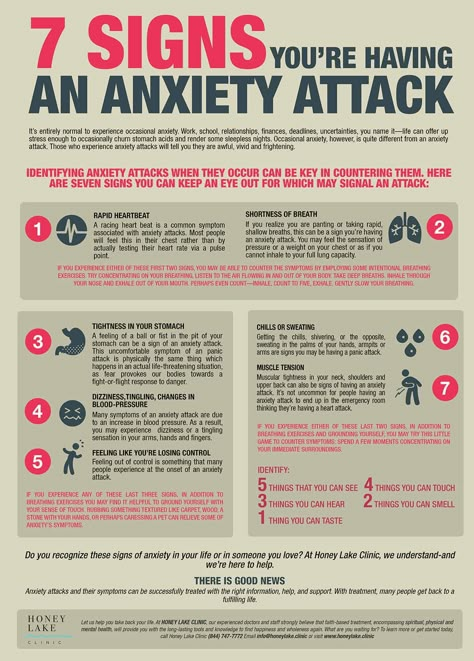 If you don't walk away from it, you give yourself a chance to know that nothing bad will happen;
If you don't walk away from it, you give yourself a chance to know that nothing bad will happen;
- When the anxiety starts to subside, start focusing on your surroundings and keep doing what you were doing before the panic attack;
- If you have a short-term sudden panic attack, it is important to have someone near you to reassure you that it will pass and there is no reason to worry.
Breathing exercises to relieve symptoms of panic attacks
If you experience shortness of breath and shortness of breath during a panic attack, breathing exercises can relieve your symptoms:
- inhale deeply and gently through your nose as slowly as possible;
- exhale slowly, deeply and gently through your mouth;
- some people may also be helped by counting out loud or mentally from one to five on each inhalation and each exhalation; nine0003
- close your eyes and focus on your breathing.
You should feel better in a few minutes.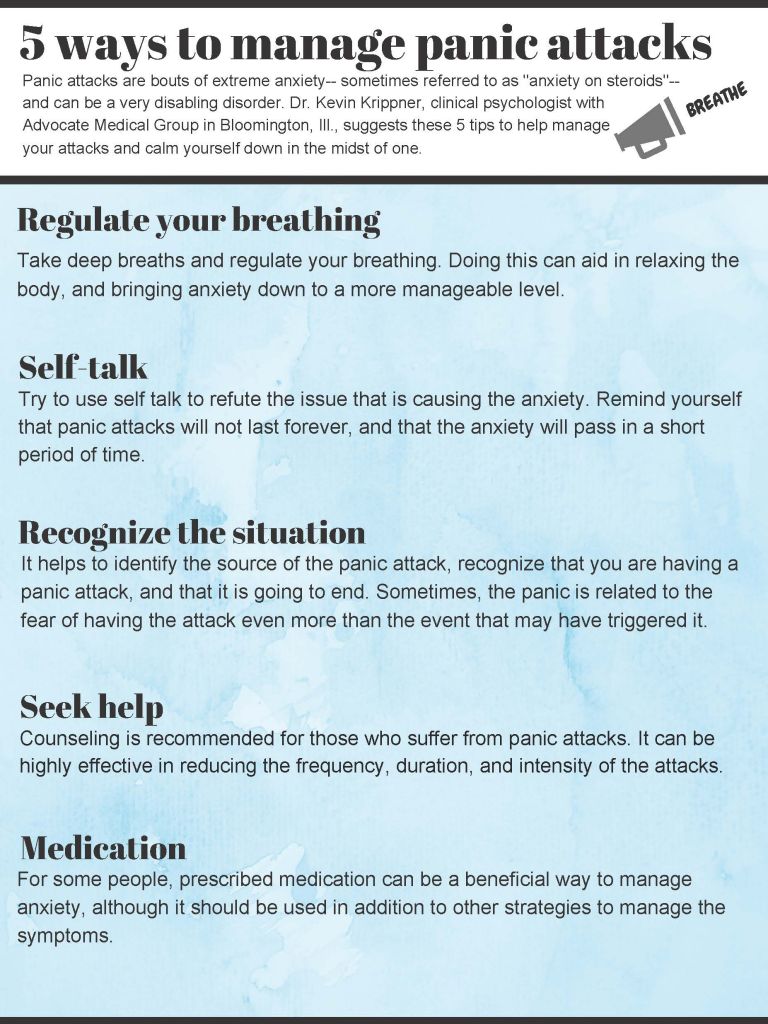 After that, you may feel tired.
After that, you may feel tired.
How to prevent panic attacks?
- You should try to find out what factor is causing stress and may worsen your symptoms;
- It is important not to limit your daily activities and movement;
- Daily breathing exercises will prevent panic attacks and alleviate them when they do occur; nine0003
- Regular exercise, especially aerobic exercise, can help control stress levels, relieve tension, improve mood and increase self-confidence;
- Eat sensibly, do not skip main meals and snacks to stabilize blood sugar levels;
- Avoid caffeine, alcohol and smoking - these can make panic attacks worse.
Cognitive Behavioral Therapy can identify and change the negative thought patterns that fuel your panic attacks. nine0003
I have panic disorder, what should I do? What is the difference between panic disorder and a panic attack
- If you feel constant stress and anxiety, especially about when your next panic attack might occur, you may have a panic disorder.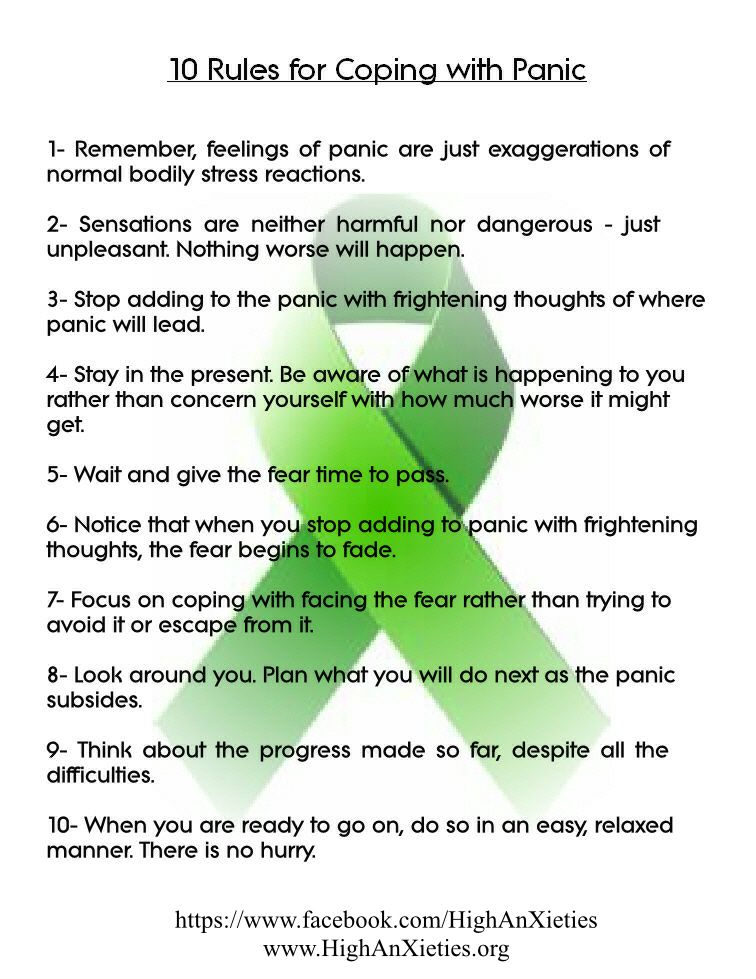
- People with panic disorder can avoid situations that may trigger a panic attack. They may be afraid and avoid public places (agoraphobia). nine0003
There is no quick solution to the problem, but if attacks occur more often, we recommend that you seek medical help from doctors.
To book an appointment, please call 0 800 305 911.
Medicover will make sure that your mental health is at its best and no panic attack can ruin your life.
Causes and symptoms of panic attacks. What to do and how to fight?
Dietary supplements cheap
What is a panic attack? How can it arise? How to identify and identify this phenomenon? Let's look into the issue together with the specialists of the Korsakov Medical Center.
What does a panic attack mean and what are its symptoms?
The classic definition is that a panic attack is a spontaneous attack accompanied by anxiety. Most often, panic attacks appear after frequent stressful conditions. It must be understood that the state of panic is characteristic of people, if there are reasons, but a panic attack is characterized by suddenness. A person experiences fear, incomprehensible anxiety, panic, horror for no reason. Biologically, a large amount of adrenaline enters the bloodstream, and an attack lasts from one minute to forty. nine0003
It must be understood that the state of panic is characteristic of people, if there are reasons, but a panic attack is characterized by suddenness. A person experiences fear, incomprehensible anxiety, panic, horror for no reason. Biologically, a large amount of adrenaline enters the bloodstream, and an attack lasts from one minute to forty. nine0003
Free consultation now!
Online consultation with a specialist on your issue!
License number: LO-77-01-019036
How do you know that you or your loved one may have a panic attack? Let's look at the main symptoms of this disease.
Symptoms of a panic attack
A person in this state experiences an uncontrollable attack of fear. It is characterized by the following manifestations:
- Cold sweat
- Attack of panic or anxiety
- Migraine
- A clouding of consciousness
- begins to darken in the eyes
- It becomes difficult to breathe
- begin to tremble limbs 9,00029,00029,00029,0002
9000.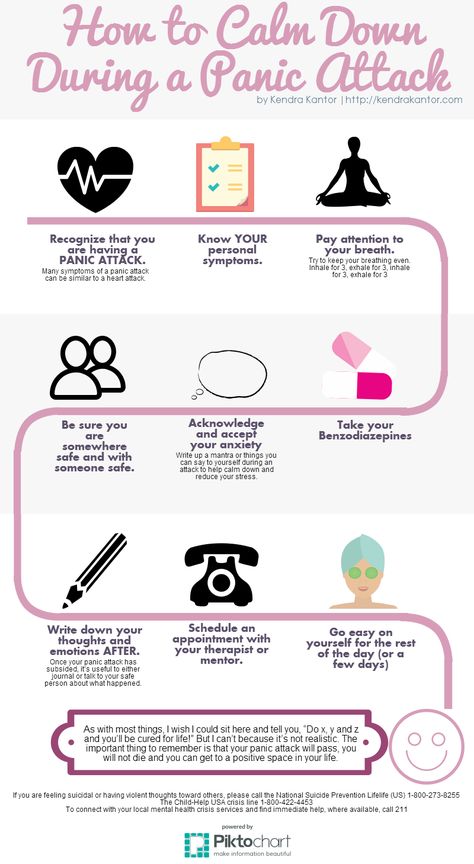
After a person experiences stress, our body reacts to it. The first reaction is to release adrenaline into the blood. Further, there is a decrease in blood vessels, breathing becomes more intense, heartbeat accelerates. The result is hyperventilation of the lungs. There is a rapid accumulation of lactic acid in muscle tissues. There is pain in the body. And all this together tells the brain that the body has just experienced stress. nine0003
Further, our body understands that it has just experienced a state of stress, but such a state is not received without a reason, as a result, the body reacts with a panic attack. I must say that people who are not prone to panic attacks react differently to minimal stress.
If you feel panic, fear, anxiety before an event, such as a job interview, final exam, public speech, an important conversation with a loved one, and other similar events, then this is normal. This is a natural reaction of the body and nervous system before a significant event in your life.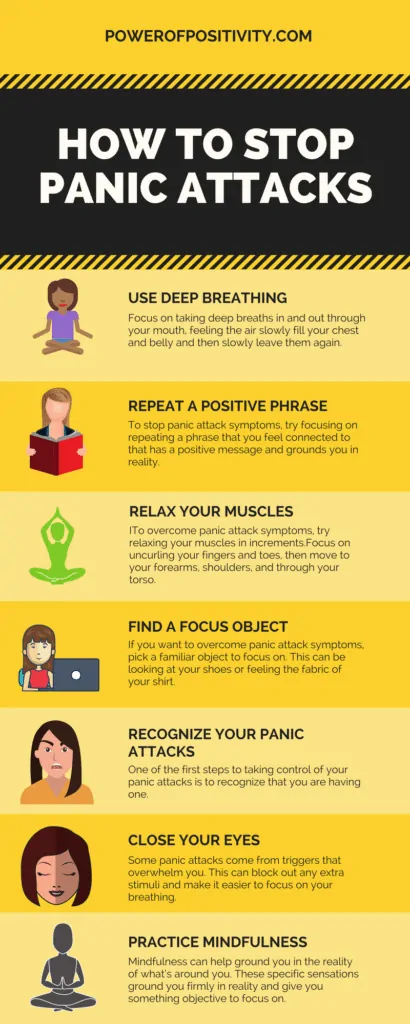 nine0003
nine0003
But if you or your loved one is experiencing all of the above symptoms without a good reason or life threatening, then it may very well be a panic attack.
“Do you suspect that you or someone close to you has a panic attack?
Get a consultation at the psychiatric department of the KORSAKOV clinic.”
Causes of panic attacks
The causes of panic attacks are now being actively studied by medicine. As a rule, an attack of uncontrolled panic occurs in patients with vegetovascular dystonia, and this phenomenon can also be inherited. People who have suffered any mental illness or are in a state of prolonged stress for a long time are also at risk and prone to panic attacks. nine0003
I must say that attacks can occur suddenly, but also external stimuli can lead to panic attacks. If a person has undergone heart surgery, a stroke, a change in hormonal levels, then he is at risk.
Causes of panic attacks in women
We would like to separate the female body and its inherent causes for panic attacks.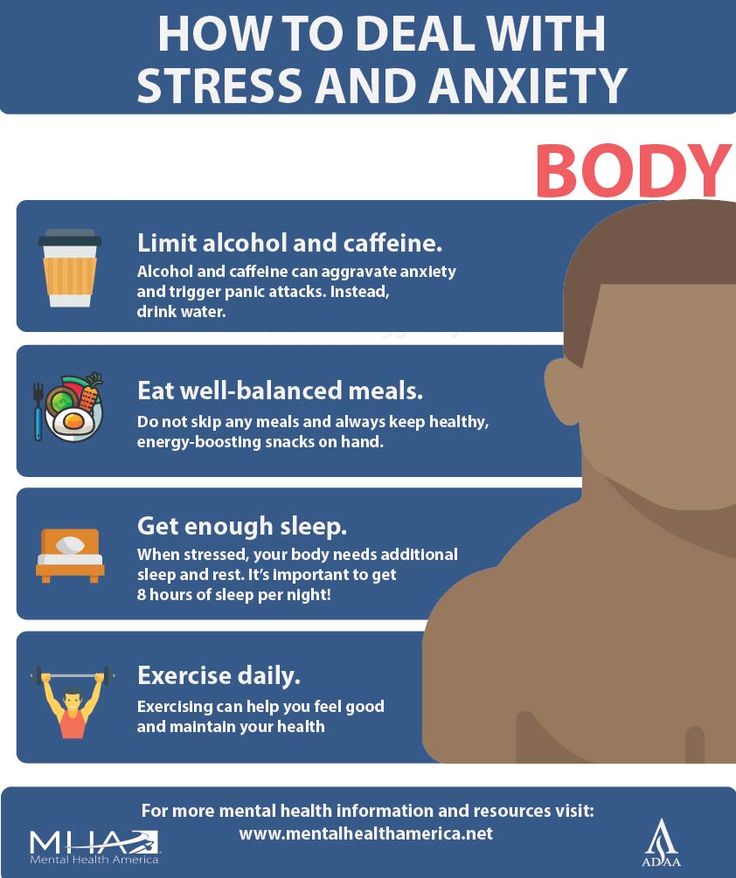 Changes in the hormonal background as a result of the menstrual cycle, pregnancy, childbirth, menopause negatively affect women's health. If external factors are superimposed on this, then very often a woman cannot cope with general stress, and panic attacks begin. nine0003
Changes in the hormonal background as a result of the menstrual cycle, pregnancy, childbirth, menopause negatively affect women's health. If external factors are superimposed on this, then very often a woman cannot cope with general stress, and panic attacks begin. nine0003
Causes of panic attacks in adults
Certain types of people are at risk for panic attacks. From our practice, we want to single out the following groups of working age: workaholics, overly responsible people experiencing highly emotional stress. Also, if a person experiences high-intensity physical or intellectual stress, the body reacts with stress and the risk of panic attacks increases.
Write to WhatsApp
COST OF TREATMENT
What to do in case of panic attacks
It is important to properly help with this condition. If you understand that you are prone to panic attacks, or among your acquaintances there is such a person, then you should know how to act when a panic attack occurs.
Panic Attack First Aid
If you observe symptoms similar to ours in a loved one, or the person himself knows when this condition will begin and asks for help, help is needed. Take the person outside to get access to oxygen. If this is not possible, open the windows and fill the room with fresh air. Support a person: talk, ask about his well-being, it is important to speak in a calm, soft and measured voice. A tactile sign of attention is also important: hug a person or take his hand. nine0003
If you yourself are prone to seizures, you need to know both self-help methods and measures to prevent seizures.
Panic Attack Prevention
If you find yourself having panic attacks, you should make a list of things to do to help you regain your sense of calm.
Switch your attention. You understand what caused a panic attack, learn to switch and not think about the event that caused it. To do this, learn to control your condition. nine0003
nine0003
Concentrate on something. Choose any object in the environment, its detail. Carefully study the selected object, try to notice all the details of which it consists. Focusing on the details will help restore clarity of thought.
Treatment of panic attacks
Panic attacks are treated with medication or psychotherapy. We will talk about effective methods of treatment.
Medical treatment
The purpose of the method is to stop a panic attack and control future attacks.
There are many drugs available to help control panic attacks and control the body. Any medications are prescribed by an experienced doctor (psychotherapist or psychiatrist). In no case do not try to choose the drug yourself, consult with a specialist. When choosing a drug, the doctor takes into account the individual characteristics of the patient and predicts possible side effects, based on this, the drug is selected. Tell the specialist in advance about your individual intolerance to substances (if you have already experienced this) and about your lifestyle (when you drive, whether you play sports, when you fall asleep and what time you get up).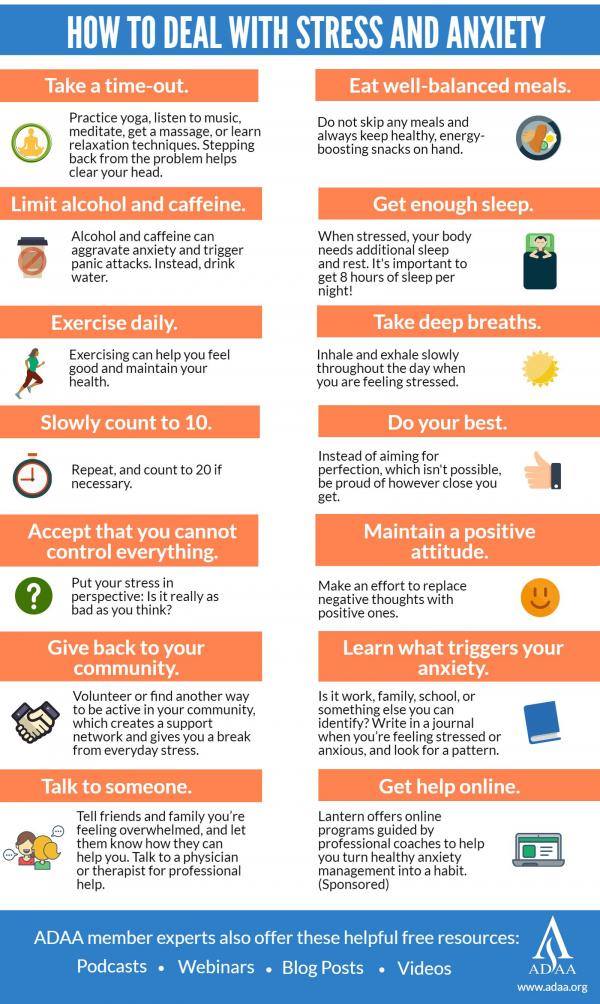 nine0003
nine0003
Psychotherapeutic treatment
In psychotherapy it is necessary to identify the cause. The doctor must determine why a panic attack occurs. The psychotherapist diagnoses the patient and, based on this, selects the necessary method of treatment. Let's talk about each method in more detail.
Cognitive behavioral therapy
In this method, the therapist teaches the patient to control his thoughts. The patient learns to understand the conditions and factors that cause anxiety. Together with the doctor, the patient understands his lifestyle and rhythm of life, and work begins to return the state of control. The course is discussed with the attending physician individually. The goal of therapy is to establish control over the patient's emotional background. nine0003
Psychoanalysis
In psychoanalysis, it is necessary to find out what factors influenced the occurrence of panic attacks. This may be a change of residence, conflicts in the family, a hidden feeling of resentment, problems from childhood, a feeling of guilt towards a loved one, etc. After establishing the true factor, the doctor explains to the patient how to properly seek a solution to the problem.
After establishing the true factor, the doctor explains to the patient how to properly seek a solution to the problem.
Classic hypnosis
Used as a therapy. I must say that hypnosis is not suitable for all patients due to the fact that for some it simply does not work. A relatively fast method of therapy, the doctor makes certain settings for the patient, which require several sessions. nine0003
Erickson hypnosis
Suitable for almost all patients. The doctor draws the patient's attention to his inner experiences, then directs him to the necessary solutions to problems. During the procedure, the patient communicates with the doctor and communicates with the doctor.
Family therapy
There is a joint work with family members: the therapist tells about the patient's experience to his family members. A list of recommendations for patient support is jointly thought out. The problems that have arisen in the family are considered, and ways to solve them are proposed. The patient is treated as part of the family. nine0003
The patient is treated as part of the family. nine0003
Gestalt Therapy
With this method, the attending physician looks for an imbalance in a person. Moreover, this balance is considered as a set of human needs. The psychotherapist looks for what needs the refusal occurred, communicates with the patient and offers a solution. To restore balance, a person must satisfy his vital needs.
Online consultation with a specialist
for your question!
License number: LO-77-01-019036
Useful advice from a psychotherapist at the Korsakov Medical Center
To reduce the frequency of panic attacks and get rid of it, you need to lead a healthy lifestyle. Do not load the nervous system, eliminate overvoltage and irritating factors. Meditate, learn the described breathing exercises. Work on your irritants, learn to restrain and control them. Work on concentration in psychotherapy sessions.
Watch your diet: do not consume sweets and coffee in large quantities.